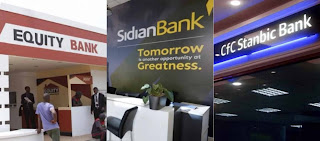Revealed: Kenya’s Most Expensive, Cheapest Loans
By Business Daily
Absa Bank
Kenya leads a group of large lenders offering the most expensive loans in the
market, according to disclosures that rank small institutions as the cheapest
providers of credit.
A borrower taking Sh1 million personal secured
loan for one year from Absa will incur a total credit cost of Sh143,007.
The same loan size on similar duration at
Sidian Bank will cost Sh140,807, Ecobank Kenya (Sh121,407), Family Bank
(115,624), Standard Chartered Bank Kenya
(Sh115,000) and Equity Bank (Sh108,057).
The ranking is based on tabulations of banks’ charges
on the website developed by the Kenya Bankers Association (KBA) and the Central
Bank of Kenya (CBK) to boost transparency and competition in the lending
market.
The data shows that interest rates charged by
the 36 banks in the database range from 11 per cent to 13.63 per cent, with the
variations in the total cost of credit-driven largely by differences in
non-interest charges.
Top 10 most expensive lenders
The small lender does not levy charges like
legal, insurance and processing fees, according to the cost of the credit portal.
These non-interest charges are what have inflated total lending costs among most of the big banks. By eschewing the special fees, other small lenders have joined Bank of Baroda to offer the cheapest loans.
Credit Bank, First Community Bank, Housing
Finance
and Kingdom Bank are all pricing an Sh1 million personal secured loan at
Sh71,807, almost all of it being interest charges.
KBA’s chief executive Habil Olaka says that
the portal has become more reliable over time.
“It is updated as the information changes at the banks,” Mr Olaka said. “They (banks) are reminded every two weeks but the update on the total cost of credit is meant to be as it changes. Initially, it used to be every two months in line with the monetary policy meetings.”
KCB is the only big bank ranked among the
group of second-cheapest lenders, with the lender also pricing a similar-sized
loan at Sh71, 807.
KCB has disclosed non-interest charges in the
portal for secured loans, but information on its website indicates it charges a
negotiation fee of 2.5 per cent and taxes.
Top 10 cheapest lenders
Disclosures by top banks such as KCB, Equity
and Cooperative Bank
have in the recent past shown that at least 70 per cent of their deposits
do not attract interest.
Equity, for instance, said the cost of its
Sh691 billion as of the end of last September was at 2.2 per cent, down from 2.4 per cent in September 2019.
Analysts have linked the higher cost of credit
among big banks to their strong pricing power based on a wide distribution
network, multiple services and entrenched brands.
Small lenders on the other hand are forced to
compete for customers by offering relatively cheaper credit.
This marks a reversal compared to the years
before the interest rate when small banks had the highest cost of credit.
This was based on the small lenders taking
expensive wholesale deposits and adding a margin. The rate caps, which were in
place between September 2016 and November 2019, boxed all banks to lend at a
maximum rate of 14 per cent for most of the period.
There has been no sharp rise in interest rates
despite the removal of lending rate controls, with the CBK lowering its
benchmark lending rate and warning banks against arbitrary rate hikes.
However, the non-interest charges levied by
most banks are raising the actual cost of funds for borrowers.
This is demonstrated by the total cost of
credit at Absa being Sh82,427 more than at Bank of Baroda despite the interest
rate charged by the former being only two percentage points higher.
Absa’s total cost of credit is broken down
into interest (Sh71,807), negotiation fees (Sh33,000), legal fees (Sh25,000),
credit life insurance (Sh6,600) and excise duty (Sh6,600).
KBA says the cost of credit indicated on the
website may not reflect the actual loan repayment burden, adding that it serves
as a starting point for borrowers shopping for the best deals.
“The estimate provided is not a loan contract
and is a non-binding approximation of the cost of a bank loan in an effort to
help prospective borrowers estimate loan costs,” the association says on the
website.
“If you are interested in a bank loan, you should
contact a bank directly for an official loan estimate as bank charges and fees
may vary.”
Some lenders, for instance, have omitted their
non-interest charges in a move that may make their cost of credit appear
cheaper than they actually are.
Interest rates have been pointing downwards
for the better part of last year, but the Covid-19 disruptions that led to
massive layoffs and pay cuts have hurt the appetite for lenders to grow loan
books.
The average lending rate touched 11.75 per cent in September last year —the lowest since the early 1980s— as banks cut appetite for
lending in the wake of the Covid-19 pandemic that had raised defaults. The
figure rose slightly to 12 per cent in January.
The general fall in lending rates was partly
triggered by the cut in CBK benchmark rate from nine per cent in November 2019
to the current seven per cent.
Banks have been seeking to raise interest
rates on loans to riskier customers but the CBK has stalled the efforts by not
taking action on the proposals.
If you are looking for a lucrative online business opportunity in Kenya, look no further than First and Fast Capital International. A perfect beginner’s investment plan allows you to reap the best cash flow return.
When you buy shares at fnfcom, you get to earn a 163% on your invested capital in three months. Interestingly, you can buy a single share or up to a maximum of five.
With nothing to invest in, First and Fast Capital International. aims to grow you up to a capitalist.










Comments
Post a Comment